|
|
| |
|
 | Search: |
|
|
|
|
|
 |
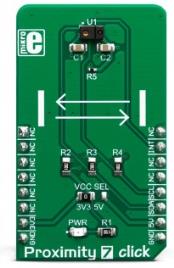
|
|
Proximity 7 click is an advanced proximity and ambient light sensing Click board™. It features the ADPS9930, a digital sensor IC equipped with two photodiodes (PD) and an IR LED, driven by a proprietary LED driver circuit. It allows an accurate proximity detection for a maximum distance of 100mm. The proprietary LED current driving technique eliminates the need for calibration, simplifying the design. A huge dynamic range allows ambient light sensing closely matched to the response of the human eye, in a variety of light conditions. An extensive interrupt engine allows for a firmware optimization.
Proximity 7 click is supported by a mikroSDK compliant library, which includes functions that simplify software development. This Click board™ comes as a fully tested product, ready to be used on a system equipped with the mikroBUS™ socket.
|
|
|
|
|
 |
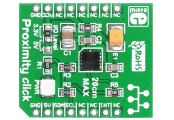
|
|
Proximity click features a VCNL4010 proximity and ambient light sensor. It combines an infrared emitter and PIN photodiode for proximity measurement with a range of up to 20cm. The VCNL4010 has a 16bit resolution which ensures excellent cross talk immunity. It can also be used as an ambient light sensor. Proximity click communicates with the target board microcontroller via mikroBUS I2C (SDA, SCL) and INT lines. The board is designed to use 3.3V power supply and 3.3V or 5V I/O voltage levels. |
|
|
|
 |
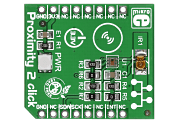
|
|
Proximity 2 click features the MAX44000, an IC that integrates an ambient light as well as a proximity sensor. The chip consists of an array of photodiodes that convert light into current, which the internal circuitry then converts into a digital value. The light sensor has a dynamic range of 0.03 to 65.535 lux. The IR proximity detector is matched with an integrated IR LED driver (for the onboard high power infrared LED). Proximity 2 click communicates with the target board microcontroller through mikroBUS I2C (SCL, SDA), and INT lines. It is designed to use a 3.3V power supply only. |
|
|
|
 |
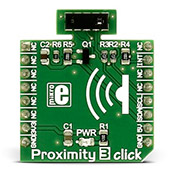
|
|
Proximity 3 click is an intelligent proximity and light sensing device, which features the VCNL4200 sensor from Vishay - high sensitivity long distance proximity sensor (PS), ambient light sensor (ALS) and 940 nm IRED, all in one small package.
With its smart sensing and light conditioning properties, the Proximity 3 click can be used in a wide range of applications: adjusting the brightness of the TFT screen depending on ambient light, turning off the TFT background light if it is covered, very accurate lux meters, reliable security sensors and so on.
|
|
|
|
 |
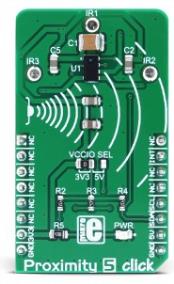
|
|
Proximity 5 click is a very accurate and reliable proximity sensing (PS) and ambient light sensing (ALS) device, equipped with the state-of-the-art PS and ALS sensor. The signal processing and conditioning section, three IR LED drivers, and the low noise analog front end with the PS and ALS photo-sensitive elements, are all integrated into the sensor IC, ensuring very accurate and reliable readings, while reducing the workload of the host MCU. The proprietary Filtron™ technology provides near-human eye light spectrum sensitivity and top-class background light cancellation scheme for the ALS section, additionally reducing the workload of the MCU. Finally, the programmable interrupt engine reduces the MCU workload, even more, saving the host MCU of constant polling of the sensor for data. |
|
|
|
 |
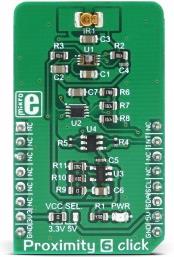
|
|
Proximity 6 click is a versatile proximity detection device on a Click board™. It can detect a foreign object distanced up to 20cm. The Click board™ features a detection sensor IC that can trigger a threshold based interrupts, which makes this Click board™ capable of detecting even simple gesture movements. The advanced onboard IC sensor features LED driver section, a light sensor with the integrated analog front end (AFE), 14 bit analog to digital converter (ADC), and digital engine for processing and aggregation of the measurement result, which simplifies the firmware development. The ambient light cancellation includes both digital and optical filtering, resulting in increased detection reliability. |
|
|
|
 |
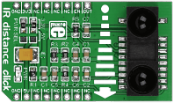
|
|
IR distance click carries Sharp's GP2Y0A60SZ0F distance measuring sensor. The sensor module comprises an integrated PSD (position sensitive detector), an infrared LED and a signal processing circuit. The measuring range is between 10 and 150 cm. The sensor is not easily influenced by the reflectivity of the object, but it's important to keep the lens clean. The click board outputs an analog voltage corresponding to the distance of the object (through the mikroBUS AN pin). An Enable (EN) pin is also utilized. The board is designed to use either a 3.3V or a 5V power supply. |
|
|
|
 |

|
|
IR reflect click carries a GP2S700HCP reflective photointerrupter and an onboard potentiometer. On this type of photointerrupter the infrared emitter and receiver are facing the same direction; the infrared beam from the emitter gets bounced back to the receiver when an object is placed within the detecting range of the sensor. IR reflect click communicates with the target board microcontroller through mikroBUS AN and INT pins (an onboard potentiometer sets the Interrupt threshold). It’s designed to use either a 3.3V or 5V power supply. |
|
|
|
 |
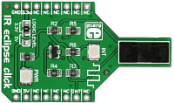
|
|
IR eclipse click carries an EE-SX198 photo interrupter sensor. This sensor consists of an infrared transmitter and receiver facing each other and spaced apart by a 3mm slit. When the beam from the transmitter is eclipsed by placing an object in the slit (like a piece of paper), the sensor is activated (indicated by the onboard INT LED). This type of sensor is typically used in printers, copiers, vending machines and so forth. IR eclipse click communicates with the target board through the mikroBUS INT line. It’s designed to work with either a 3.3V or 5V power supply. |
|
|
|
 |
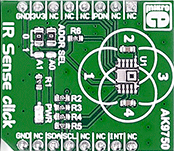
|
|
IR Sense click carries the AK9750 quantum-type IR sensor. The click is designed to run on a 3.3V power supply. It communicates with the target microcontroller over I2C interface, with additional functionality provided by the INT pin on the mikroBUS™ line. |
|
|
|
 |
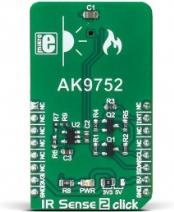
|
|
Short range infrared sensor
IR Sense 2 click is the infrared sensor Click board™, designed to be used for the short range IR sensing applications. Unlike other pyroelectric sensors, it is able to sense environmental heat changes up to 1m, even through the glass. IR Sense 2 click is perfectly suited for human presence detection, so it can be used in many human presence detection applications. A programmable interrupt engine simplifies the software development and saves MCU cycles, that would be otherwise wasted on polling. The ability to sense IR through the glass allows an unconstrained design of the final product. |
|
|
|
 |
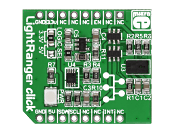
|
|
LightRanger click is a proximity sensor carrying ST's VL6180X IC. This chip is based on ST's patented FlightSense technology: the sensor - consisting of an IR emitter, ambient light sensor, and range sensor - calculates distance by measuring the time it takes for a photon to travel to the nearest object and back (Time of Flight). In contrast to conventional IR proximity sensors which derive distance by measuring the amount of light reflected, VL618OX works with all objects, regardless of their color or reflectivity. LightRanger click communicates with the target board MCU through mikroBUS I2C pins (SCL, SDA), with additional interrupt (INT) and enable (EN, in place of default mikroBUS CS pin). |
|
|
|
 |
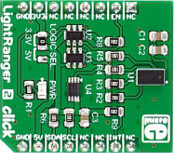
|
|
LightRanger 2 click carries VL53L0X IC from STMicroelectronics, the word's smallest Time-of-Flight ranging and gesture detector sensor. The click is designed to run on either 3.3V or 5V power supply. LightRanger 2 click communicates with the target microcontroller over I2C interface and the following pins on the mikroBUS™ line: RST, INT. |
|
|
|
 |
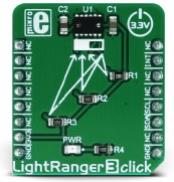
|
|
Light Ranger 3 click is an accurate distance measurement Click board™ based on a ToF (Time of Flight) measurement principle. The Simblee™ enabled RFD77402 rangefinder module from RF Digital is a complete measurement stack on the chip. It is surprisingly easy to work with, as this highly integrated range finder module exposes the only I2C interface and INT pin to the host controller. It features the VCSEL, a Vertical Cavity Surface Emitting Laser, used to emit a narrow band of a harmless modulated light beam in the IR range (850 nm), and a receive sensor, which can detect the reflected light. It can measure distances up to 2000mm, with up to 10% accuracy. The device is rated Class 1 LASER product, operating in the IR (invisible) spectrum range. |
|
|
|
 |
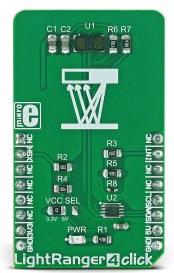
|
|
Light Ranger 4 click is an accurate distance measurement Click board™ based on a ToF (Time of Flight) measurement principle. The FlightSense™ enabled VL53L1X rangefinder module from STMicroelectronics is a complete measurement stack on the chip. It is surprisingly easy to work with, as this highly integrated range finder module exposes only I2C interface, XSH and INT pins to the host controller. It features the invisible Class1 laser emitter, used to emit a narrow band of a harmless modulated light beam in the IR range (940 nm), physical infrared filters and optics to achieve the best ranging performance in various ambient lighting conditions with a range of cover window options. It can measure distances up to 4000mm, with up to 50 Hz ranging frequency. |
|
|
|
 |
|
|

